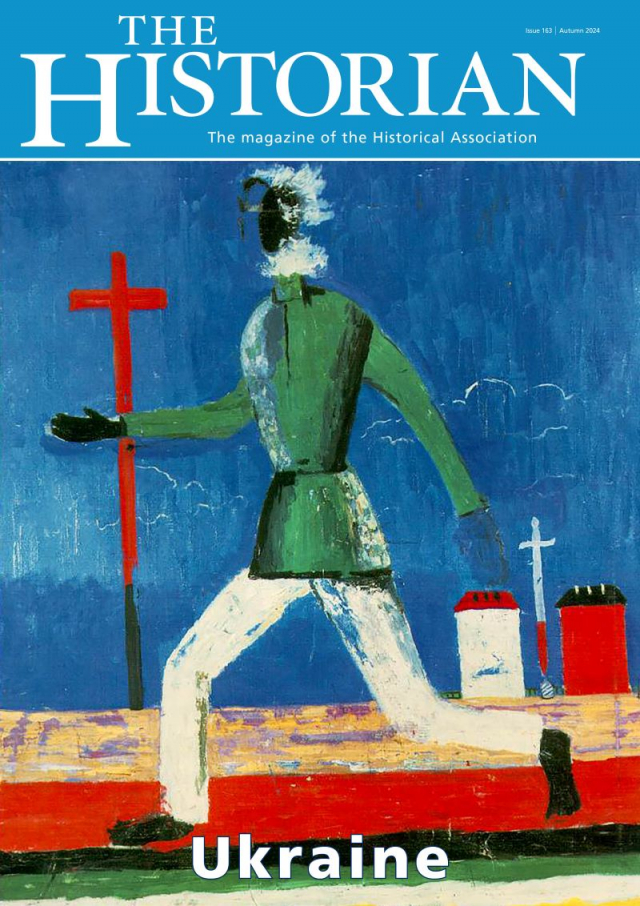The Historian 163: Out now
The magazine of the Historical Association

Editorial: Ukraine
Read The Historian 163: Ukraine
The third year of Russia’s full-scale invasion into Ukraine is slowly drawing to a close, with no end to it in sight. Putin’s decision to send troops into Ukraine in hope of a quick capitulation was, however, only the last stage of a longer process known as a ‘hybrid’ war that began in February 2014, following Ukraine’s seemingly irreversible drift towards Europe. As a result of the Revolution of Dignity on the streets of Kyiv and other cities, Russia annexed Crimea and instigated separatist regimes in the eastern industrial regions of Donbas. What followed was a war that displaced many individuals, families, and institutions and resulted in many casualties, but was largely ignored outside of Ukraine. Over the centuries there have been misperceptions of Ukraine as a country, resulting in an idea that it was ‘divided.’ As a result, the war was also sometimes misunderstood as a ‘civil war.’ Historians’ voices from Ukraine have until recently remained marginal to broader discussions within the discipline, meaning that historical scholarship has been plagued by similar misconceptions.
The themed articles in this issue of The Historian have been guest edited and are intended to provide readers with an insight into some of the historical developments as well as their perceptions and interpretations, coming from Ukrainian scholars themselves. Tetiana Vodotyka provides us with an overview of the ways in which changing political, military and economic circumstances have shaped western views of Ukraine over centuries. The link with our second article is perhaps obvious: Olha Makliuk investigates the ways in which Ukraine’s cultural heritage has been used by Russia to influence historical narratives. Aspects of that cultural heritage then become the focus of our remaining themed articles. Kateryna Petrova explores Ukrainian murals from the last 40 years. Beginning as a proscribed protest against a totalitarian regime, street art has developed into an authorised and popular way both to celebrate and challenge current events. Finally, Olena Braichenko reflects on the ways in which modern Ukrainian cuisine draws on its historical roots in order to sustain a population at war. It is hoped that by placing Ukrainian voices front and centre, this issue will begin to redress some of the misconceptions that have marked the history of Ukraine over many years.
Our other articles encompass both the breadth and depth of historical study: David Fleming surveys the surprisingly troubled history of the English calendar, while Joshua M. Reinke focuses on an American Quaker whose abolitionist career helped to highlight the cause of emancipation. This edition, however, is almost double-themed. Mark Stoyle shares the case of Alice Molland, supposed to have been the last English woman executed for witchcraft, and a fascinating Doing History which explains how he undertook his research. Meanwhile, A.D. Bergin describes a large-scale witchcraft trial in Newcastle. Although unplanned, this series on the history of witchcraft serendipitously coincides with this autumn’s HA short course on Witchcraft, Werewolves and Magic in European History.
As many readers will be aware, The Historian is undergoing a period of change as we phase out some of our regular features and replace them with new ones developed from the feedback you have given us over recent years. One popular request was for articles which surveyed recent historiographical developments. In our first Update, therefore, Ryan Hampton describes how the ‘spatial turn’ has affected the way historical events are understood. Another priority was stronger links to our branch network, so in this issue we are delighted to launch ‘From Our Branches’ with John Oliphant’s story of the new East Sussex branch. Emily Vine also invites readers to take part in a crowdsourcing history project.
In our final My Favourite History Place, Gabriella Howell takes us to a plantation house on the Caribbean island of Antigua, while Steve Illingworth introduces us to the Real Life of Cecily Cook, pacifist leader of the Women’s Co-operative Guild during the Second World War. Tom Hamilton discusses the Renaissance master, Albrecht Dürer, with eminent historian Ulinka Rublack, whose recent biography Dürer’s Lost Masterpiece has received glowing reviews, while 2023 Wolfson Prize nominee Oskar Jensen shares his Opinion on historical drama. You might also like to listen to his recent talk to the HA’s Virtual Branch, ‘Vagabonds Versus the Mendicity Society: Fear and Loathing on the Streets of London’.
Finally, we would like to extend our thanks to Maggie Wilson, who has stepped down as editor of The Historian after many years’ service. She will be a hard act to follow, but we hope to be able to announce the appointment of two new editors soon.

